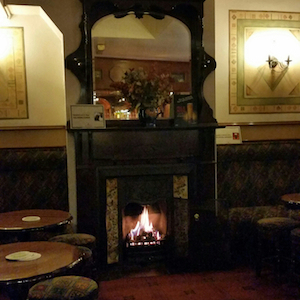I like a nice breakfast; I just rarely have one. If I manage to down a decent coffee or two before noon I consider my morning to have been moderately less than miserable. When I’m back in my other home – just outside of Atlanta, Georgia – we will, on the odd weekend morning, stop at our local cheap and cheerful Waffle House, a southern U.S. institution. In the unlikely event you find yourself at one of their grills, add a double order of hash browns to whatever you’re having and ask for them scattered, smothered and covered. Unlike my American wife, whose taste runs to pecan waffles drowning in syrup and butter, I would forever forego anything Waffle House has to offer for a genuine Irish breakfast. And the “Real Corker” (their words) at Nash 19 on Princes Street is as good as it gets.
Author: Tomás Murray
Forde’s on the River
Technically the address for Forde’s may be Barrack Street – and it does indeed have a door that opens onto the bottom of that street, below the Flying Enterprise – but in truth the pub’s long facade sits squarely on Sullivan’s Quay, looking out onto the Lee with the South Gate bridge just to the left. If you asked me to choose between my usual stops – Forde’s and An Spailpín – I couldn’t. And wouldn’t. I’m fond of both but frequent them for very different reasons.
Tuesdays with White Horses
I wandered in to An Spailpín on my way home late one Tuesday just before Easter for a quiet pint of Murphy’s, and, truth be told, for the comfort of the fireplace in the snug beside the bar after what could most economically be described as a bad day. I was immediately wrapped in the tender embrace of multiple guitars playing Neil Young’s heavenly Unknown Legend (from Harvest Moon), with a majestic male chorus carrying the ethereal beauty of Neil’s lyrics with ease:
She used to work in a diner
Never saw a woman look finer
I used to order just to watch
her float across the floor
Last Thoughts: Disappearing Editors & Unwelcome Newcomers
Based on a Mar. 16th lecture by Gearóid Ó Súilleabháin
A late 2009 article in the Guardian, Wikipedia falling victim to a war of words, claims that Wikipedia is losing volunteers, with unhappy editors deserting for a number of reasons: an increasingly cumbersome editing process; squabbling with established editors; and claims of all-controlling power cliques.
A more recent 2014 piece echoes some of those concerns noting that active editors dropped by a third since the 50,000 plus number of 2007.
An article in January of 2015, Wikipedia votes to ban some editors from gender-related articles, while primarily addressing a specific controversy (GamerGate), notes that “byzantine internal processes of Wikipedia are incomprehensible” to many contributors and that an “unwelcoming atmosphere for new editors has long been blamed for an overwhelmingly masculine make-up”. It notes that just one in ten editors are believed to be female and quotes from Wikipedia’s own article on systemic bias which suggests that the “gender gap has a detrimental effect on content coverage”.
An October 2013 feature, The Decline of Wikipedia, in the MIT Technology Review, provides a detailed critique of the problems besetting the encyclopedia. As others have, the author notes the decline in the volunteer workforce, the lack of diversity in Wikipedia’s predominately male makeup, the abrasive atmosphere, and the increase in
bureaucratic processes and rules – intended to combat bad editing and vandalism – which has deterred newcomers. A referenced study reinforces the notion of bureaucracy – including increased manual and automated deletion of newcomer contributions – as primary culprit. The author does allow considerable space to the viewpoints of a Wikipedia executive – who talks about what is being done to make editing easier and the environment more welcoming – and an active administrator. However the word “labyrinthine” is used in relation to Wikipedia’s rules and guidelines – the core Neutral Point Of View (NPOV) policy is noted as now being almost 5,000 words long – and a top administrator, an Irishman, states that “policy creep” is the real issue.
Wikipedia Redux: Finkelstein & Carr
Based on a Mar. 16th lecture by Gearóid Ó Súilleabháin
In reading a particularly scathing September 2008 article, Wikipedia isn’t about human potential, whatever Wales says, by Seth Finkelstein in the Guardian, I was struck by the invoking of Ayn Rand, and the line which concluded that the “hype may be about the fulfillment of human potential, but the reality is the exploitation of digital sharecropping.”
Finkelstein has written a number of articles mildly or sharply critical of Wales, Wikipedia and the for-profit Wikia venture, such as:
- How will Wikia cope when the workers all quit the plantation?
- Sting in the Scorpions tale is the exposure of Wiki’s weakness
- Shutdown of Wikia Search proves empty rhetoric of collaboration
- The moral quandary of involving Wikipedia in online ‘censorship’
The term “digital sharecropping” comes from Nicholas Carr who noted that “one of the fundamental economic characteristics of Web 2.0 is the distribution of production into the hands of the many and the concentration of the economic rewards into the hands of the few.”
In a 2005 blog post titled The amorality of Web 2.0 Carr pours cold water on Tim O’Reilly’s and Kevin Kelly’s enthusiasm for Wikipedia arguing that it is unreliable and poorly written with scant evidence of the heralded collective intelligence. His choice of paragraph title, “The Cult of the Amateur”, points to sympathies with Andrew Keen which is made clear by his statement that if forced to choose he would take the professional over the amateur. He says that Web 2.0 promoters “venerate the amateur and distrust the professional” and notes their “unalloyed praise of Wikipedia”. In discussing how the Internet is altering creative economics, Carr states that “Wikipedia might be a pale shadow of the Britannica, but because it’s created by amateurs rather than professionals, it’s free. And free trumps quality all the time.” In a May 2007 Guardian article, he sets forth the notion that the Internet “is being carved up into information plantations” with Wikipedia being returned at or near the top of every set of Google search results.
In an August blog post in the same year, Rise of the wikicrats, Carr, in discussing the difficulty encountered by a long-time Wikipedia contributor when adding a new entry, notes that the Wikipedia bureaucracy boasts a very intricate hierarchy and a significant level of complexity in its rules. He notes the ascendancy of the “deletionist” ethic over the “inclusionist”, philosophies he addressed in some detail in a prior post.
Criticisms of Wikipedia are multitudinous. Ironically a good jumping off point in reviewing the censure leveled is Wikipedia itself which has a well-referenced criticisms page, divided essentially between content and community. I hope to return to some of the contrarians – Jaron Lanier and the notion of the “hive mind” in particular – in a future post. Wikipedia also has a replies page devoted to answering the more common attacks.






